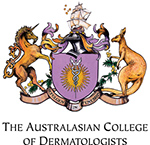Recipient of the 2021 Eczema Association of Australasia Inc Funding Grant
“The grant aims to help better understand and address the needs of patients in Australia and the EAA’s hope for the future is that there will be better outcomes eczema patients. Offering a grant for research has been a goal for the EAA for many years and has been achieved with the help of their supporters – our thanks to them” – Cheryl Talent, EAA President
2021 is the first year that College has administered a grant on behalf of Eczema Association of Australasia Inc (EAA) to support Fellows and Trainees undertake research into eczema and atopic dermatitis.
College received a total of seven high-quality applications for the grant covering a range of eczema and atopic dermatitis areas.

We are pleased to announce that Prof Pablo Fernández-Peñas, Head of Dermatology, Westmead Hospital, Joint Head/Speciality of Dermatology, The University of Sydney, has been awarded the grant for his project ‘Atopic dermatitis endotypes: Relationships and correlations of IgE serum levels and protein biomarkers’. Congratulations to Prof Fernández-Peñas and his team.
Project significance
Treatment failures and partial responses in atopic eczema (AD) could be due to the intrinsic heterogeneity of the disease. IgE has been shown to play a role in the inflammatory process of atopic disorders however its role in atopic dermatitis is not yet fully understood. In this study we will look at the correlation between high and low IgE serum levels with the epidermal protein profile and related molecular pathways. We will collect non-invasive skin samples from normal-looking skin and serum samples from patients and analyse them using data independent acquisition mass spectrometry-based proteomics and bioinformatics analysis. Compared to other techniques available, proteomic analysis is safer, cheaper, and easier to perform. Our hypothesis is that this polygenic disease will have a different proteosome in the stratum corneum that will explain the immunologic reaction and IgE production. This study will increase our understanding of the AD spectrum and lead to new targeted approaches to improve AD management.
This grant was made possible by the support the EAA receives from their corporate members.
Grants, awards, fellowships and scholarships enable Fellows, trainees, researchers and medical students to be recognised and supported throughout Australia and abroad.
The EAA thanks the Australasian College of Dermatologists for and administering and overseeing this research grant





